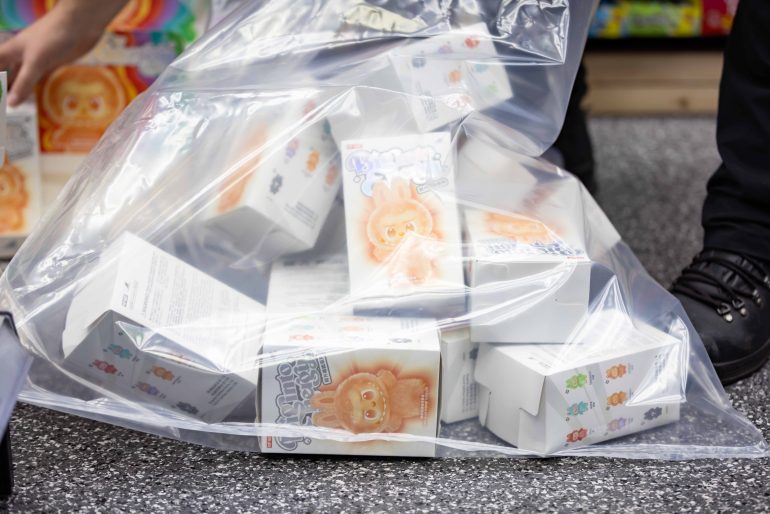A number of fake Labubu dolls have been seized in Liverpool, as part of a joint operation between Merseyside Police and Trading Standards.
Officers carried out enforcement visits at two stores on Ranelagh St and Church St, on Tuesday 14 October, and found just under 100 counterfeit dolls, being sold for £7.99.
The action forms part of Merseyside Police’s Operation Scent, which targets the sale of fraudulent perfumes and other counterfeit goods.
Counterfeit toys may seem like a bargain, but they can be unsafe and may help fund criminal activity.
The genuine Labubu dolls are identified by their furry, monster-like appearance and have been made popular by Chinese toymaker Pop Mart.
Counterfeit versions often display twisted limbs, misshapen heads, or an incorrect number of teeth, and pose serious safety risks due to the potential presence of toxic paint, sharp edges, or unsafe stuffing.
Upon inspection of a similar counterfeit Labubu doll, the item was found to be poorly constructed, with its head and feet twisting and loosening easily. The internal stuffing tore open with minimal force and appeared potentially hazardous – especially for children – as it may contain unsafe materials such as toxins or sharp objects.
As Christmas approaches and many of us begin shopping for gifts, Merseyside Police and Trading Standards are urging residents to be cautious when buying toys.
Before making a purchase, ask yourself: Does this shop usually sell toys? Check that the packaging is of good quality and includes essential safety marks such as the CE or UKCA symbol. Packaging should also contain warning and usage instructions.
Operations like this often demonstrate how the trade in counterfeit goods can be linked to wider criminal networks and other serious offences.
Liverpool City Centre Neighbourhood Sergeant Richard Clare said: “We understand that some people may not see the harm in buying counterfeit toys, especially when they’re cheaper or appear similar to the real thing. But behind these fake products are serious risks – not just to children’s safety, but to our communities.
“Counterfeit and illicit goods are rarely just about fake products; they’re often linked to wider criminal networks that cause real harm in our communities. That’s why it’s vital we seize these items and thoroughly investigate those responsible.
“We’re committed to protecting the public and we urge everyone to think twice before buying counterfeit goods, especially with Christmas coming up. What may seem like a harmless bargain could be funding crime and putting lives at risk.”
Councillor Harry Doyle, Liverpool City Council’s Cabinet Member for Health, Wellbeing and Culture said: “Counterfeit toys can be dangerous and misleading, especially when they’re aimed at children.
“I’m pleased to see our Trading Standards team work in partnership with Merseyside Police to crackdown on the sale of these goods to protect shoppers and raise awareness ahead of the festive season.”
The operation coincides with the launch of the national “Fake Toys, Real Harms” campaign, led by the Intellectual Property Office (IPO). The campaign warns consumers about the serious health and safety risks posed by counterfeit toys, including toxic materials, choking hazards, and unsafe construction – especially in products aimed at young children.
These include banned chemicals linked to cancer, dangerous choking hazards, and other serious risks – even in toys marketed at toddlers and infants.
Since the start of 2025, more than 200,000 counterfeit Labubu dolls have already been seized before reaching UK consumers, accounting for around 90% of all counterfeit toys seized in the UK this year. Experts have since valued the haul at nearly £3.3 million. Shocking findings following raids also show that 75% of counterfeit toys seized failed critical safety tests.
How to avoid buying counterfeit toys
Before you buy:
- stick to trusted retailers or official brand websites and be cautious with third-party sellers on marketplaces
- check reviews carefully. Look beyond the five-star ones and read the negatives
- be wary of prices that look “too good to be true” – counterfeits are often much cheaper
- make sure the toy has not been recalled by searching the brand and product name
When the toy arrives:
- look for a UKCA or CE safety mark and a UK contact address on the packaging
- check the packaging looks professional and includes age warnings
- inspect the toy: no loose small parts, stuffing, or unsecured batteries
If you spot a Counterfeit or unsafe toy:
- don’t give it to your child. Return it straight away
- leave a review to warn other parents
- report the seller to the platform you bought from
- contact Trading Standards to help stop dangerous toys reaching other families


